Georgetown Recognizes Faculty, Honors Distinguished University Professors at Faculty Convocation
Georgetown formally honored recently promoted and tenured faculty members in the fall faculty convocation.
The annual ceremony brought together faculty from Georgetown’s Main Campus, Medical Center and the Law Center to recognize faculty members who attained the rank of professor, associate professor or assistant professor.
“This is a joyful ceremony. We celebrate the achievements of our colleagues who’ve earned advancement in the professoriate or the award of tenure,” Provost Robert M. Groves said in his remarks. “And with Dr. Antoine Garibaldi … we will contemplate the educational aims that we pursue daily at this institution and indeed in the wider world of academia.”
Georgetown President John J. DeGioia also shared his congratulations to the newly promoted faculty and charged them to continue their pursuit of knowledge
“We take a moment to pause and reflect on this shared commitment to the pursuit of knowledge, to exploration and to honor our colleagues who embody the very best of this pursuit,” DeGioia said. “In the classroom, in the laboratory, in the library, in the field, in each setting for academic engagement, our faculty provide the foundation for the work of formation. You provide opportunities for our students to engage deeply with knowledge.”
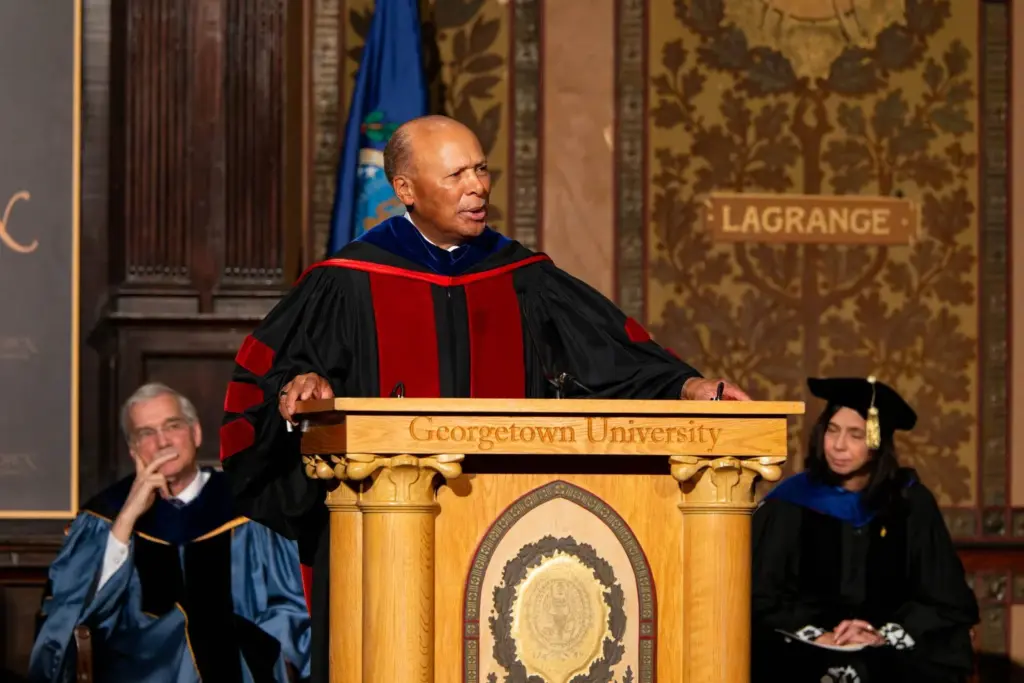
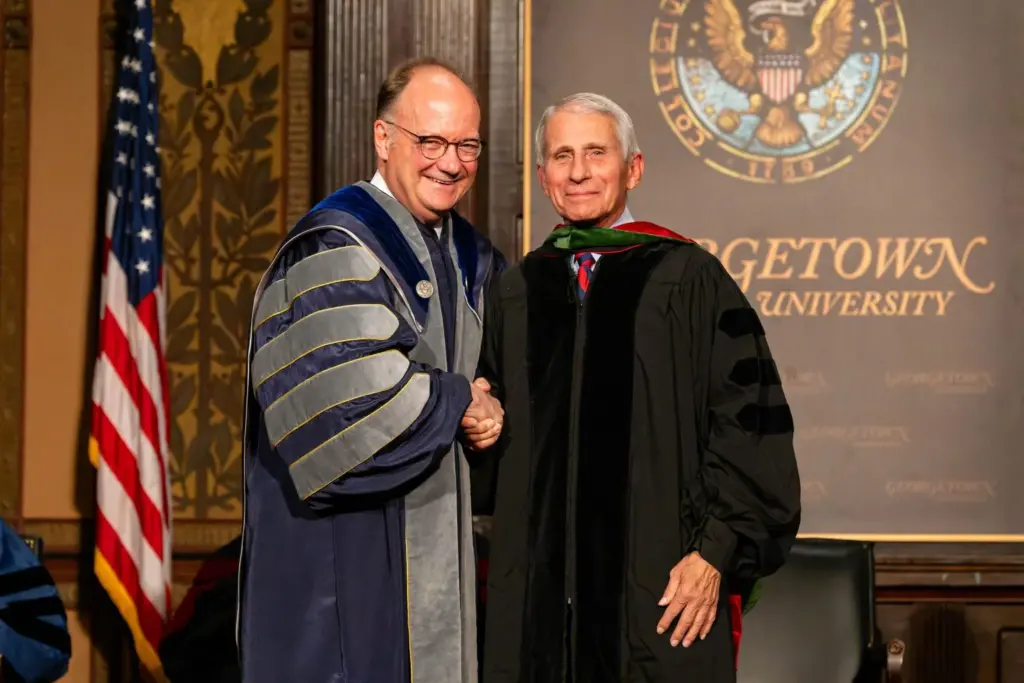
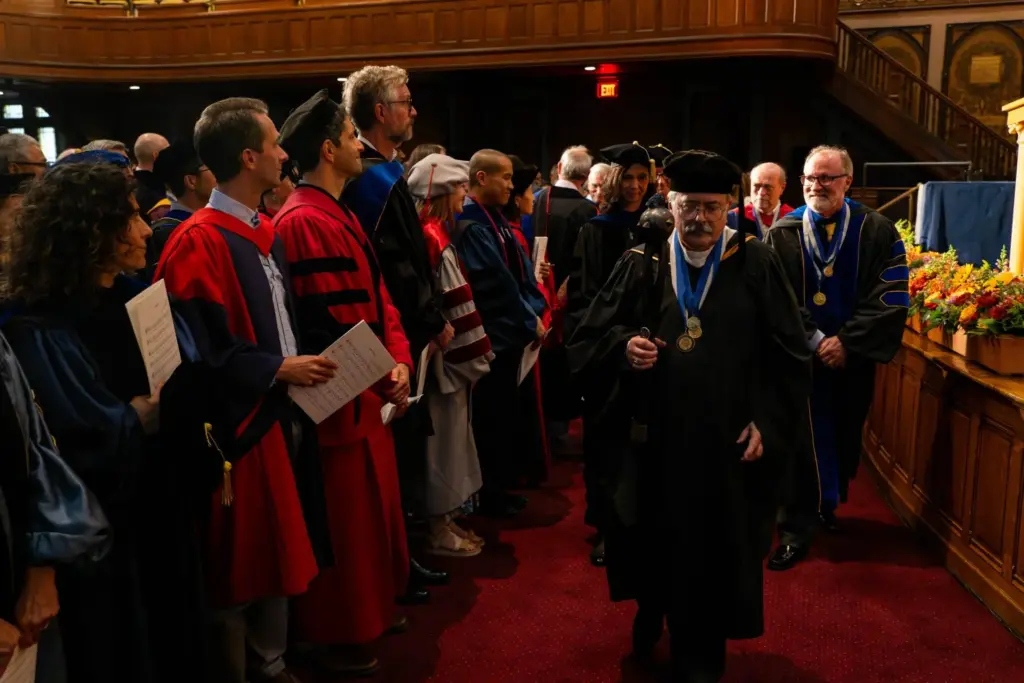
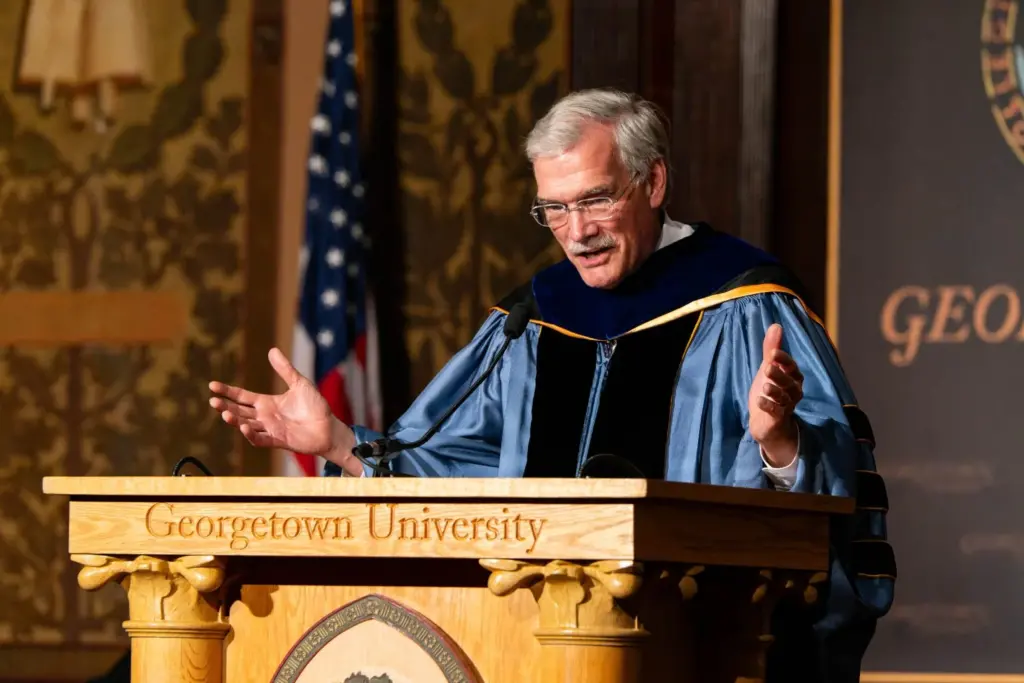
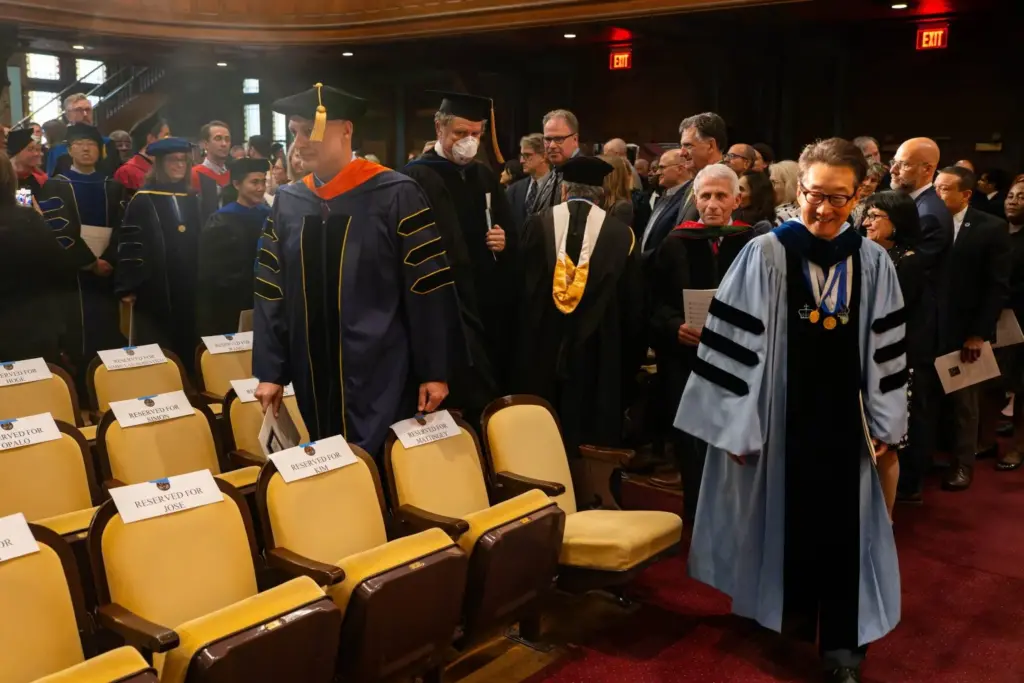
Every year, the faculty convocation hosts a speaker for the “Aims of Education” lecture. On Monday, the keynote address was given by Antoine M. Garibaldi, president emeritus and distinguished university professor at the University of Detroit Mercy. The university’s first African American and lay president and the first publicly acknowledged African American president of a Jesuit University, Garibaldi spoke on the challenges, joys and higher purpose of teaching and reminded the faculty of their indispensable responsibility as role models.
“Role models are unselfish with their time, always candid, listen closely to everything we say and, fortunately, are not afraid to disagree with us when we think we have a good idea,” Garibaldi said in his speech. “So cherish your unassuming status as a role model and mentor to thousands of students who have taken your classes or received advice from you, and remember your impact is lasting and the amount of individuals you will assist in the future will be enormous.”
Georgetown also recognized the Distinguished University Professors who have been appointed in the last year. The title is Georgetown’s highest professional honor that recognizes extraordinary achievement in scholarship, teaching and service.
“Georgetown reserves this designation for faculty members of extraordinary achievement, whose preeminent accomplishments have earned them substantial recognition not only from their academic peers, but also from the world at large,” Groves said.
Learn more about the six faculty members who have been recently named Distinguished University Professors.
Lucile Adams-Campbell

Lucile Adams-Campbell is a cancer epidemiologist and health disparities researcher. She is the associate director for minority health and health disparities research at Lombardi Comprehensive Cancer Center and senior associate dean for community outreach and engagement at Georgetown University Medical Center. She also is director of the Ralph Lauren Center for Cancer Prevention at Georgetown Lombardi. Adams-Campbell’s research focuses on health disparities with particular emphasis on cancers that disproportionately impact African-Americans including clinical trials and lifestyle interventions among minority and underserved populations in Washington, DC, and beyond.
She received a B.S. in biology and a M.S. in biomedical science from Drexel University in Philadelphia, Pennsylvania. She is the first U.S. Black woman to receive her Ph.D. in epidemiology, which was obtained from the Graduate School of Public Health at the University of Pittsburgh.
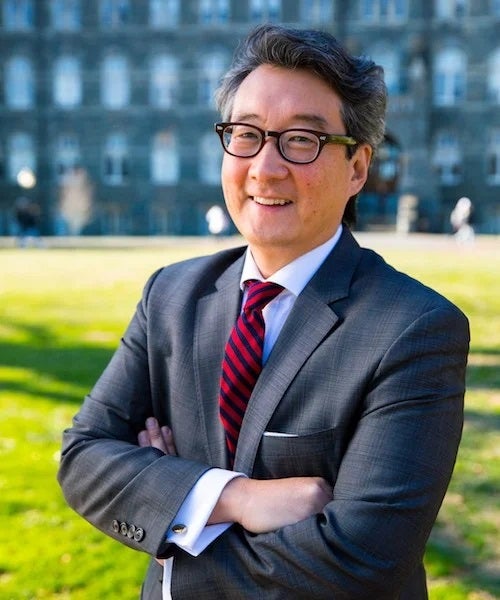
Victor Cha
Victor D. Cha is a professor of government and D.S. Song-KF Endowed Chair in the Edmund A. Walsh School of Foreign Service. He has been a member of the Georgetown faculty for more than 25 years. He previously served as vice dean in SFS and as director of Asian Studies, creating the M.A. degree in Asian Studies and bringing more than $1 million in U.S. Department of Education Title VI funding related to Asia to campus for the first time in Georgetown’s history. Outside of Georgetown, Cha holds research appointments at the Center for Strategic and International Studies in Washington, DC and at the George W. Bush Institute in Dallas, Texas (non-resident). He is co-editor of the Contemporary Asia book series at Columbia University Press, is a foreign affairs contributor for MSNBC and NBC News, and serves on the boards of the National Endowment for Democracy and the Korea Society.
He is currently a member of the non-partisan Defense Policy Board for the Biden administration. He previously served as director for Asian affairs at the National Security Council. At the White House, Cha was also the deputy head of delegation for the United States at the Six Party Talks in Beijing and received two Outstanding Service commendations during his tenure at the NSC. He is the author of seven books and received the 2023 Hubert H. Humphrey Award from the American Political Science Association (APSA) for honorable notable public service. Professor Cha received his PhD from Columbia University, his BA (Honours) from Oxford University, and his BA from Columbia University.
Anthony Fauci
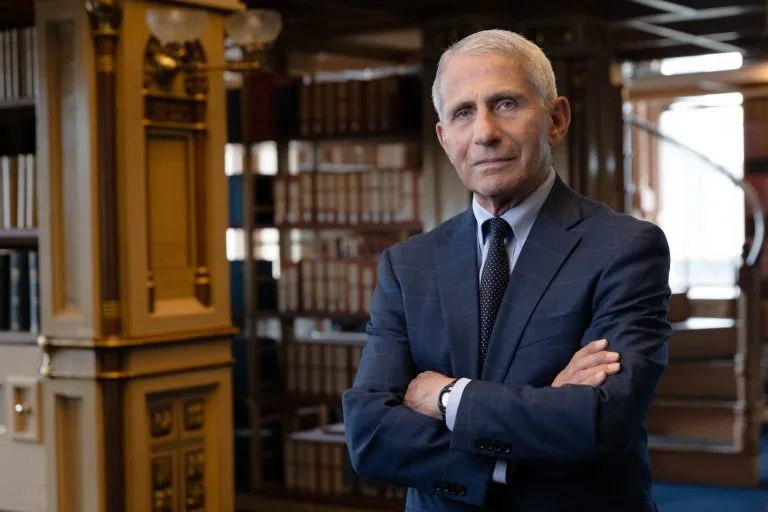
Dr. Anthony Fauci is a Distinguished University Professor in the School of Medicine’s Department of Medicine in the Division of Infectious Diseases. He also holds an appointment in the McCourt School of Public Policy. Fauci, a physician, leading immunologist and infectious disease researcher, most recently served as the director of the National Institute of Allergy and Infectious Diseases (NIAID) at the National Institutes Of Health (NIH) in Bethesda, Maryland.
Fauci navigated seven U.S. presidential administrations through infectious disease threats, including HIV/AIDS, SARS, MERS, avian influenza, swine flu, Zika, Ebola and COVID-19, among others. He played a crucial role as a lead researcher on the study, diagnosis and treatment of HIV/AIDS and was a key architect of the U.S. President’s Emergency Plan for AIDS Relief (PEPFAR), which has helped save more than 25 million lives worldwide.
He served 38 years as director before stepping down in December 2022 to continue advancing public health by mentoring and inspiring the next generation of leaders in science, health care and public service.
Janet Mann

Janet Mann is a professor of biology and psychology who is an expert in the field of animal behavior. Since 1988 her work has focused on social networks, female reproduction, calf development, life history, conservation, tool-use, social learning and culture among bottlenose dolphins in Shark Bay, Australia.
Mann has published over 130 scientific papers in journals and was twice a fellow at the Center for Advanced Study in the Behavioral Sciences at Stanford University. Since 1997, her research has been supported continuously by the National Science Foundation, but she has also received funding from a range of foundations and government agencies nationally and internationally. She frequently interviews with the New York Times, National Geographic, public television stations and on National Public Radio.
John Rust

John Rust is an economics professor in the College of Arts & Sciences and an expert in applied micro, applied econometrics and computational economics. He previously held the Gallagher Family Professorship. Rust is most well known throughout the profession for his pioneering contributions to the area of structural econometrics. His scholarship has been acknowledged by various editorial appointments and his election as a fellow of the Econometric Society and as a founding fellow of the International Association of Applied Econometrics. For his paper, “Optimal Replacement of GMC Bus Engines: An Empirical Model of Harold Zurcher” he was awarded the prestigious Frisch Medal.
Rust joined the Economics Department at Georgetown University in 2012 after holding positions at University of Wisconsin, Yale University and the University of Maryland. In his time at Georgetown John has continued to distinguish himself through his scholarship, his service and his mentoring of students.
Richard Schlegel
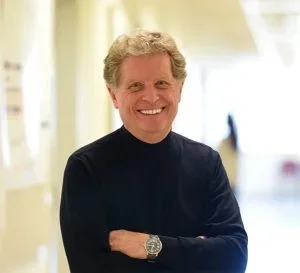
Dr. Richard Schlegel is a professor and the Oscar B. Hunter Chair in the Department of Pathology at the School of Medicine. Schlegel’s laboratory at Georgetown co-developed the technology for the human papillomavirus (HPV) vaccine – the first cancer prevention vaccine – for which the dominant patent for the vaccine technology was awarded by the U.S. Patent Office in 2005. HPV causes almost all incidences of cervical cancer, the second-leading cause of cancer deaths in women worldwide, and contributes to numerous other cancers.
Schlegel’s laboratory is currently developing, with grants from the Bill and Melinda Gates Foundation and the National Institutes of Health (NIH), second- and third-generation vaccines that could be used to prevent HPV and decrease the incidence of HPV in the developing world, where almost all deaths from cervical cancer occur. Schlegel’s laboratory utilizes a wide range of experimental approaches to investigate HPV/host interactions at the immunological, cellular, and molecular levels.
He received his M.D. and Ph.D. from Northwestern University Medical School, and was a resident and post-doctoral fellow at Harvard Medical School (Brigham Hospital) in the fields of pathology and virology.
This article was originally published by Georgetown University. Please follow the link to read the full story.
